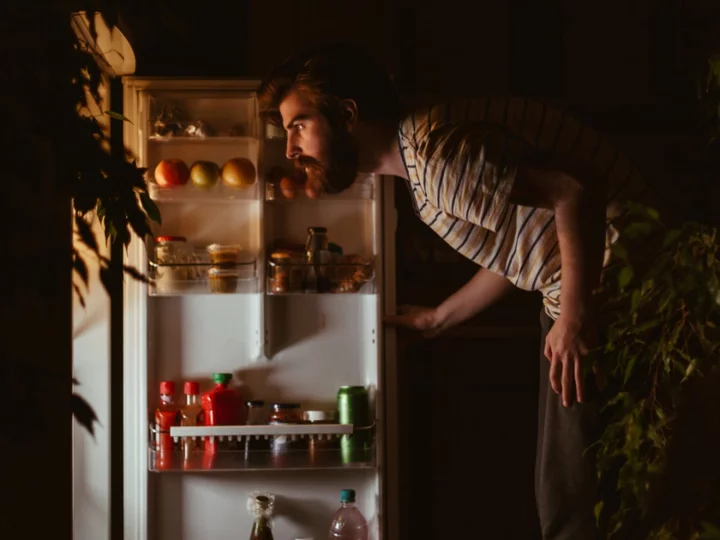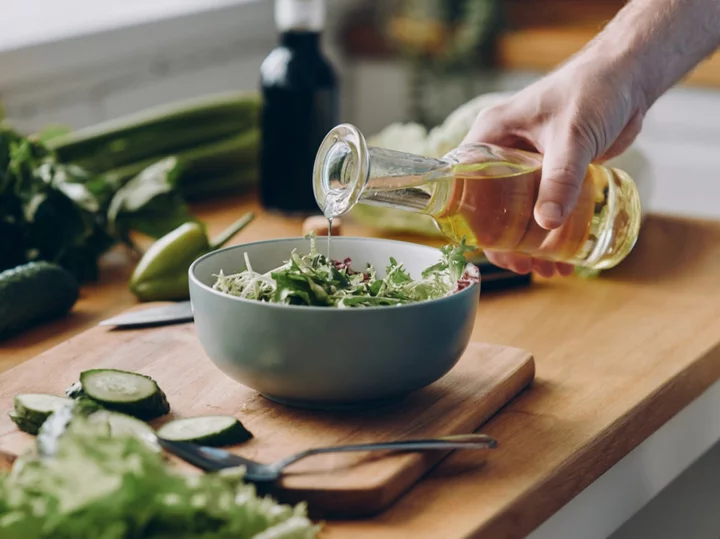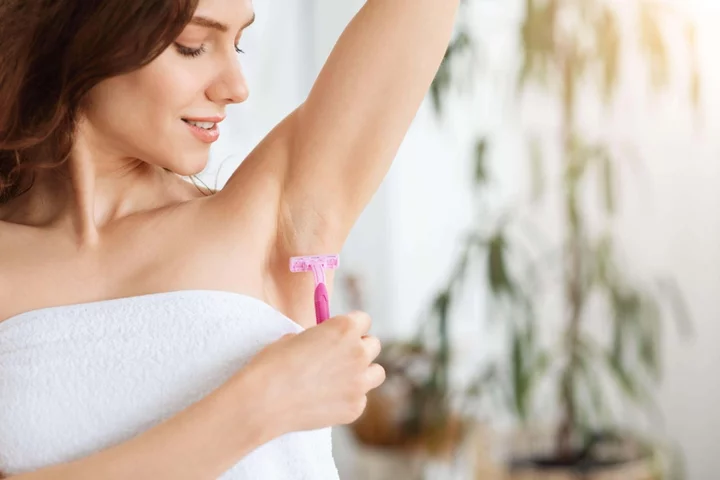
The most unhygienic things in your kitchen revealed – and how to get them clean
It’s likely there are countless things in your kitchen which look clean, but actually, they’re filthy. Could your dishcloths be making you sick? When was the last time you washed your tea towels? And do we really need to bleach the sink more than once a month? We asked an expert to find out. Knobs, door handles, and buttons The buttons and dials on your kitchen appliances could be a germ-fest. “People often neglect to clean these areas of the kitchen,” says Danielle Mason, a cleaning content creator – or ‘cleanfluencer’ – who creates tutorials and videos on TikTok and Instagram. “Most of the time, they don’t think it is important, but as you’re commonly handling raw meat and food, it’s extremely important to keep these areas clean, due to cross-contamination. “Always sanitise with a cloth – I like to do this with Zoflora, as it leaves a great smell afterwards, and kills bacteria from dirty fingers.” Cloths If what you clean with isn’t clean, chances are, your kitchen isn’t either. “I always leave my cloth to soak in bleach before going to bed every night,” says Mason. “This enables a new start in the morning with no bacteria. Also, make sure you’re replacing the cloths – I would suggest a new one every two weeks, whilst still bleaching every night. And make sure you’re not using this cloth on anything other than the kitchen, as you do not want to cross-contaminate.” Sponges Mason stresses sponges are unhygienic, as they’re constantly damp and can carry E. coli. “People tend not to use sponges, as they carry so many more germs, and even putting them in the microwave will not kill all of them. Avoid a sponge where possible.” Dish towels Dish towels and tea towels may not be changed anywhere near often enough. “You should have one for every day of the week, as they carry so many bacteria and germs, which get spread across the kitchen. If you’re drying pots and pans, and then wiping down your surfaces, it’s not good,” she says. Chopping boards Chopping boards – particularly wooden ones – could be a haven for bacteria. “You should have a different colour for different types of food, one for meat, fruit, and other foods,” advises Mason. “The best way to clean them is in a dishwasher, as it’s good to get rid of all the germs due to the very high heat. If you don’t like the dishwasher, then boil the kettle water and leave the chopping boards to soak in it. I use a steam cleaner on mine, as it kills 99.9% bacteria and there are no chemicals.” It is best to avoid wooden chopping boards altogether, as these cleaning methods may damage them. Kitchen sink “This is a massive breeder of bacteria and grime; a distinct microbiome is found in sinks. “The plumbing area found beneath sinks revealed microbial communities dominated by a group of bacteria called Proteobacteria. This phylum includes pathogens such as Salmonella and E. coli, which can cause serious disease,” Mason shares. “I’ve always been taught never to wash my hands in the sink, and to never throw dirty water down the sink. You wash your cups and plates in the sink and prepare food, so it should always be kept clean, and nothing from outside the kitchen should cross-contaminate that. For example, never wash your floors and put dirty water in your kitchen sink, always throw it down the toilet.” How do you possibly clean the inside of your sink and drains? “Baking soda and vinegar is the best way to clean your sink out, or bleach, but you must be careful with bleach, as it can stay in the bottom of your sink, depending on the material it’s made of. I clean my sink out every day.” Pipes and cupboards around your sink could be leading you to have a rodent problem. “You can prevent mice and rodents from entering the kitchen by covering any small crevices or cracks. It is also important to repair leaks as soon as they happen, as they can come through the pipes,” she says. Fridges “Deep clean [your fridge] every two months. A normal cleaning – the wiping of shelves – should be done every other day with soapy water. For any bad smells, use baking soda, which will absorb the smell from the fridge,” Mason continues. “The fridge is a breeding ground for salmonella, E. Coli and other bacteria.” Bins Where you throw your waste away could be a breeding ground for germs. “Make sure you keep [outdoor] rubbish bins away from your house, and make sure you empty your bin as soon as it’s full,” advises Mason. “I personally do not keep a bin in the kitchen, I use a bag and I take that out by the end of the day, but if you are using a bin, make sure you bleach it with hot kettle water, to keep it smelling fresh.” Read More Charity boss speaks out over ‘traumatic’ encounter with royal aide Ukraine war’s heaviest fight rages in east - follow live Laura Whitmore: I feel unsafe as a woman Meet the professional cuddler charging £70-an-hour to hug ‘the big spoons in life’ New warnings about ‘concerning’ rise in at-home cosmetic dentistry
2023-07-27 14:19

We are Newcastle United: When Amazon Prime documentary is released & what you should expect
With the official trailer having been released for the new We Are Newcastle United documentary, 90min offers you an update on everything you need to know about the series.
2023-07-27 01:27

Late night snacking could increase risk of diabetes and heart disease, study says
Eating a snack late at night carries significantly more negative health implications compared to snacking during the day, a new study has found. According to researchers at King’s College London, people who eat most of their snacks in the evening after 9pm saw larger spikes in their blood sugar compared to those snacked earlier in the day. The group who snacked later also had higher concentrations of fat in their blood compared to those who snacked earlier. The researchers studied data from 1,000 people who took part in the Zoe Predict study. The participants kept a food diary and wore blood sugar monitors in order to keep track of the impact of snacking. On average, they ate two snacks a day, with one in three “late evening snackers” eating most of their snacks after 9pm instead of between meals. High blood sugar and fat can lead to diabetes and heart disease, studies have found. People with diabetes are also more likely to have other conditions that raise the risk of heart disease, such as high blood pressure. The Zoe Predict project is a group of in-depth nutritional research studies that aim to reveal how and why people respond differently to the same foods. Kate Bermingham, a postdoctoral fellow at King’s College London and lead author of the study, said: “Surprisingly little has been published on snacking, despite the fact that it accounts for 20 to 25 per cent of energy intake. “Predict followed a large number of people and captured detailed information on their snacking behaviours, allowing this in-depth exploration of snacking on health.” Researchers analysed the relationship between the number of snacks participants ate, the quality of the snacks and the timing with blood fats and insulin levels. Snacking on higher quality foods, which are described as foods that contain significant amounts of nutrients relative to the calories contained, was associated with better bodily responses. The study concluded that the most important factor in determining the body’s response is the quality of snacks, not how often or how much they are consumed. Foods like fruit or vegetables resulted in a better blood fat and insulin response compared to processed foods, such as biscuits and cake. Bermingham added: “Our study showed that the quality of snacking is more important than the quantity or frequency of snacking, thus choosing high quality snacks over the highly processed snacks is likely beneficial. “Timing is also important, with late night snacking being unfavourable for health. This may mean that, universally, snacking late in the evening and interrupting the overnight fasting window is detrimental to health.” The study was presented at a meeting of the American Society for Nutrition. Read More My Taylor Swift exercise class has led me down a luxury fitness rabbit hole Husband fired from family business after wife roleplayed with reborn dolls MrBeast YouTuber Kris Tyson comes out as transgender: ‘I’m excited to authentically be myself’ Scientists share the 8 habits that impact your lifespan the most Cara Delevingne says her journey to sobriety has been worth ‘every second/ Bisexual people ‘experience worse health than other adults’
2023-07-25 18:53

Scientists share the 8 habits that impact your lifespan the most
Scientists have identified eight unhealthy lifestyle choices which, if changed, could see people live more than 20 years longer. Lack of exercise, opioid use and smoking have the biggest negative impact on lifespan and can lead to a 30-45 per cent higher risk of death, according to the study. Stress, binge drinking, poor diet, and poor sleep hygiene were each associated with around a 20 per cent increase in the risk of death. And a lack of positive social relationships was the eighth habit mentioned and is associated with a 5 per cent increased risk of dying. Meanwhile, a separate study suggests incorporating olive oil into your diet could help reduce the risk of dying from dementia. Consuming more than half a tablespoon of olive oil per day is linked to a 28 per cent lower risk of dying from the condition, compared with those who never or rarely eat the oil, researchers say. The findings from both studies were presented at Nutrition 2023, the annual meeting of the American Society for Nutrition being held in Boston, and may include more up-to-date figures than the data initially submitted for the meeting. The research that looked at lifestyle habits used data from medical records and questionnaires collected between 2011-2019 from 719,147 people enrolled in the Veterans Affairs Million Veteran Program. It found that men who have all eight healthy habits - including high physical activity and not smoking - at age 40 would be predicted to live an average of 24 years longer than men with none of these habits, and for women an additional 21 years. Xuan-Mai Nguyen, health science specialist at the Department of Veterans Affairs and rising fourth-year medical student at Carle Illinois College of Medicine, USA, said: “We were really surprised by just how much could be gained with the adoption of one, two, three, or all eight lifestyle factors. “Our research findings suggest that adopting a healthy lifestyle is important for both public health and personal wellness. “The earlier the better, but even if you only make a small change in your 40s, 50s, or 60s, it still is beneficial.” The researchers say their findings, which have not been peer-reviewed, highlight the role of lifestyle factors in contributing to chronic diseases such as type 2 diabetes and heart disease that lead to premature disability and death. In the olive oil study, scientists analysed dietary questionnaires and death records collected from more than 90,000 Americans over three decades, during which 4,749 people died from dementia. It also found that replacing just one teaspoon of margarine and mayonnaise with the equivalent amount of olive oil per day was associated with around an eight to 14 per cent lower risk of dying from dementia. Anne-Julie Tessier, a postdoctoral fellow at the Harvard TH Chan School of Public Health in the USA, said: “Our study reinforces dietary guidelines recommending vegetable oils such as olive oil and suggests that these recommendations not only support heart health but potentially brain health, as well. “Opting for olive oil, a natural product, instead of fats such as margarine and commercial mayonnaise is a safe choice and may reduce the risk of fatal dementia.” Research suggests that people who regularly use olive oil instead of processed or animal fats tend to have healthier diets overall. However, Dr Tessier noted that the relationship between olive oil and the risk of dying from dementia in this study was independent of overall diet quality. She added that the research is observational and does not prove olive oil is the cause of the reduced risk of fatal dementia. However, Professor David Curtis, UCL, said it was difficult to assess whether the research adds much to the understanding of links between diet, health and dementia risk, as it has not been peer-reviewed. He added: “There are many, many differences between people who consume olive oil and those who do not and it is never possible to fully account for all possible confounding factors. “Another point to bear in mind is that about half of dementia is caused by vascular disease so that anything which improved cardiovascular health, such as not smoking, would be expected to reduce dementia risk. “It has been shown that olive oil consumption is associated with better cardiovascular health so one would expect that it would also be associated with lower dementia risk.” Dr Duane Mellor, registered dietitian and senior lecturer at Aston University, said: “The authors claim replacing margarine and mayonnaise with olive oil could reduce risk. “However, many people who did this would also change the food that it is being added to, which could increase vegetable, lentils, beans, peas, seeds and nut intake – all of which are linked to a healthy diet and reduced risk of conditions like dementia. “We also need to remember that it is not just what we eat that helps maintain our brain function, it is how we eat – and remaining sociable around meal times and eating with others can benefit our mental health in the short term and cognitive function as we age.” Read More The bowel cancer symptom George Alagiah wished he’d caught earlier Experts share 8 healthy habits to help you live longer Husband fired from family business after wife roleplayed with reborn dolls Cara Delevingne says her journey to sobriety has been worth ‘every second/ Bisexual people ‘experience worse health than other adults’ The bowel cancer symptom George Alagiah wished he’d caught earlier
2023-07-25 18:50

Experts share 8 healthy habits to help you live longer
Eight habits that could help people live more than 20 years longer have been identified by researchers. While it’s long been known that certain lifestyle factors can influence lifespan, the American study isolated the eight factors that have the biggest impact – being physically active, being free from opioid addiction, not smoking, managing stress, having a good diet, not regularly binge drinking, having good sleep hygiene, and having positive social relationships. The research was presented at Nutrition 2023, the annual meeting of the American Society for Nutrition, and used data from 719,147 people enrolled in the Veterans Affairs Million Veteran Program. It found low physical activity, opioid use and smoking were associated with around a 30-45 per cent higher risk of death, while stress, binge drinking, poor diet, and poor sleep hygiene were each associated with around a 20 per cent increase, and lack of positive social relationships was linked with a 5% increased risk of dying. Men who had all eight habits at age 40 were predicted to live an average 24 years longer than men with none of the habits, according to the findings, and women with all eight habits in middle age were predicted to live an extra 21 years, compared with women with none of the habits. Xuan-Mai Nguyen, health science specialist at the Department of Veterans Affairs, said: “We were really surprised by just how much could be gained with the adoption of one, two, three, or all eight lifestyle factors. Our research findings suggest that adopting a healthy lifestyle is important for both public health and personal wellness. The earlier the better, but even if you only make a small change in your 40s, 50s, or 60s, it still is beneficial.” The researchers say the findings highlight how lifestyle factors contribute to chronic diseases such as type 2 diabetes and heart disease, which are associated with premature disability and death. How to embrace the eight healthy habits Inspired to give your own lifestyle a boost? “If making these small but mighty adjustments could help you to live for an extra 20 years, maybe it’s time to make those changes,” says life and wellbeing coach, Natalie Trice. She shares the following insights and tips… 1. Do more exercise Regular exercise can help prevent a wide range of major diseases – plus it’s great for keeping stress levels in check. “Going for a walk, having a swim, running with friends, even just a good old dance-off in the kitchen can get your heartbeat up and those feel-good endorphins pumping – so get your trainers on and start moving,” says Trice. 2. Manage stress Trice suggests adopting simple stress-busting practices such as mindfulness meditation, and enjoying hobbies and sports. “These can profoundly impact overall wellbeing, as you bring your stress levels down,” she says. “This isn’t about pretending everything’s great, but rather looking at easy habits you can adopt that will take down the stress, which can lead to anxiety and burnout.” 3. Don’t smoke Quitting smoking is an essential step in improving health and potentially adding years to your life. Trice points out that while some people may think reaching for a cigarette takes the edge off their stress, there are healthier ways to cope. “Maybe going running or taking up yoga could be the release and focus you need, and one that will help you live longer, smell fresher and feel better,” she suggests. “Also, with the cost of cigarettes going up all the time, giving up will free up cash for the things in life that really need to be paid for.”If you are struggling to quit smoking, talk to your GP about options available to help. 4. Don’t binge drink “By cutting down on booze, you’re doing your body and brain a massive favour,” says Trice. “Drinking every night will impact your body and could affect your sleep and work performance. Enjoy life, but if you want to enjoy it for longer, then keep tabs on your drinking.” Official guidelines suggest drinking no more than 14 units of alcohol a week (equivalent to six medium glasses of wine of six pints of beer), spread across at least three days. 5. Eat healthily Generally speaking, a balanced diet that’s rich in fibre, whole grains, fruit and veg and lean protein, with heavily processed and sugary foods kept to a minimum, is linked with better health. “We all know about eating five-a-day but doing this can be tough if you’re busy with family and work. If you can start to do this, you’ll feel better,” says Trice. “Focus on eating regularly and thinking about what you put in your body, so that it works for you, not against you.” 6. Don’t take drugs Recreational drugs can harm health in a number of ways. Trice suggests those affected start by speaking to a trusted friend or their GP, and “look at the support which could not only extend your life, but save it”. 7. Try to get good sleep Trice says: “It’s vital that we look at getting a decent night’s sleep, as this can help you feel so much better. Making sure you have a sleep routine in place can be helpful and can be as easy as having no screens in the bedroom, having a bath or shower before you hit the sack, as well as making sure the temperature is right and you have curtains to keep the light out in the mornings.” 8. Nurture positive social relationshipsTrice observes: “If you’re able to nurture a supportive network of friends, colleagues and family, this can lead to improved mental and emotional wellbeing and a longer life.” Lacking social connections? Look at local volunteering opportunities and community walks and groups. Making friends can take time, but even finding ways to regularly spend time and interact with others can help. Read More My Taylor Swift exercise class has led me down a luxury fitness rabbit hole Husband fired from family business after wife roleplayed with reborn dolls Harry and Meghan Markle accused of snubbing Montecito neighbour Charity boss speaks out over ‘traumatic’ encounter with royal aide Ukraine war’s heaviest fight rages in east - follow live
2023-07-25 14:58

CBS NFL Game Announcers, Booth Teams for 2023 Season
Football is right around the corner and CBS is looking forward to its Super Bowl year. Earlier today they released their coverage plans, complete with how the roster will stack up.
2023-07-25 01:23

8 healthy habits to help you live longer – according to a new study
Eight habits that could help people live more than 20 years longer have been identified by researchers. While it’s long been known that certain lifestyle factors can influence lifespan, the American study isolated the eight factors that have the biggest impact – being physically active, being free from opioid addiction, not smoking, managing stress, having a good diet, not regularly binge drinking, having good sleep hygiene, and having positive social relationships. The research was presented at Nutrition 2023, the annual meeting of the American Society for Nutrition, and used data from 719,147 people enrolled in the Veterans Affairs Million Veteran Program. It found low physical activity, opioid use and smoking were associated with around a 30-45% higher risk of death, while stress, binge drinking, poor diet, and poor sleep hygiene were each associated with around a 20% increase, and lack of positive social relationships was linked with a 5% increased risk of dying. Men who had all eight habits at age 40 were predicted to live an average 24 years longer than men with none of the habits, according to the findings, and women with all eight habits in middle age were predicted to live an extra 21 years, compared with women with none of the habits. Xuan-Mai Nguyen, health science specialist at the Department of Veterans Affairs, said: “We were really surprised by just how much could be gained with the adoption of one, two, three, or all eight lifestyle factors. Our research findings suggest that adopting a healthy lifestyle is important for both public health and personal wellness. The earlier the better, but even if you only make a small change in your 40s, 50s, or 60s, it still is beneficial.” The researchers say the findings highlight how lifestyle factors contribute to chronic diseases such as type 2 diabetes and heart disease, which are associated with premature disability and death. How to embrace the eight healthy habits Inspired to give your own lifestyle a boost? “If making these small but mighty adjustments could help you to live for an extra 20 years, maybe it’s time to make those changes,” says life and wellbeing coach, Natalie Trice. She shares the following insights and tips… 1. Do more exerciseRegular exercise can help prevent a wide range of major diseases – plus it’s great for keeping stress levels in check. “Going for a walk, having a swim, running with friends, even just a good old dance-off in the kitchen can get your heartbeat up and those feel-good endorphins pumping – so get your trainers on and start moving,” says Trice. 2. Manage stressTrice suggests adopting simple stress-busting practices such as mindfulness meditation, and enjoying hobbies and sports. “These can profoundly impact overall wellbeing, as you bring your stress levels down,” she says. “This isn’t about pretending everything’s great, but rather looking at easy habits you can adopt that will take down the stress, which can lead to anxiety and burnout.” 3. Don’t smoke Quitting smoking is an essential step in improving health and potentially adding years to your life. Trice points out that while some people may think reaching for a cigarette takes the edge off their stress, there are healthier ways to cope. “Maybe going running or taking up yoga could be the release and focus you need, and one that will help you live longer, smell fresher and feel better,” she suggests. “Also, with the cost of cigarettes going up all the time, giving up will free up cash for the things in life that really need to be paid for.”If you are struggling to quit smoking, talk to your GP about options available to help. 4. Don’t binge drink“By cutting down on booze, you’re doing your body and brain a massive favour,” says Trice. “Drinking every night will impact your body and could affect your sleep and work performance. Enjoy life, but if you want to enjoy it for longer, then keep tabs on your drinking.” Official guidelines suggest drinking no more than 14 units of alcohol a week (equivalent to six medium glasses of wine of six pints of beer), spread across at least three days. 5. Eat healthily Generally speaking, a balanced diet that’s rich in fibre, whole grains, fruit and veg and lean protein, with heavily processed and sugary foods kept to a minimum, is linked with better health. “We all know about eating five-a-day but doing this can be tough if you’re busy with family and work. If you can start to do this, you’ll feel better,” says Trice. “Focus on eating regularly and thinking about what you put in your body, so that it works for you, not against you.” 6. Don’t take drugsRecreational drugs can harm health in a number of ways. Trice suggests those affected start by speaking to a trusted friend or their GP, and “look at the support which could not only extend your life, but save it”. 7. Try to get good sleep Trice says: “It’s vital that we look at getting a decent night’s sleep, as this can help you feel so much better. Making sure you have a sleep routine in place can be helpful and can be as easy as having no screens in the bedroom, having a bath or shower before you hit the sack, as well as making sure the temperature is right and you have curtains to keep the light out in the mornings.” 8. Nurture positive social relationshipsTrice observes: “If you’re able to nurture a supportive network of friends, colleagues and family, this can lead to improved mental and emotional wellbeing and a longer life.” Lacking social connections? Look at local volunteering opportunities and community walks and groups. Making friends can take time, but even finding ways to regularly spend time and interact with others can help. Read More Charity boss speaks out over ‘traumatic’ encounter with royal aide Ukraine war’s heaviest fight rages in east - follow live George Alagiah: What are the signs of bowel cancer? Carol Vorderman says she no longer sunbathes after health scare Carol Vorderman: Why my skin cancer scare means I no longer sunbathe
2023-07-24 21:51

This is how often you should actually change your razor
Reckon you could get another shave out of your razor? We’ve all done it, wondering how long we can actually use one, as we whip it out again and again. Well, it may not be worth the risk to your health, according to dermatologist and Dove expert, Dr Cristina Soma. So, how often should you change your razor? “More people cling on to their razors for much longer than is advised, and are surprised when we recommend that a razor is changed every five to seven shaves,” says Soma. “The frequency of change also depends on other factors, such as how frequently and how many areas you shave, your hair thickness and type, the quality of your blade, and whether you are good at washing it off afterwards and looking after your blade.” What happens if you don’t? “Most of us own a dull blade full of skin cells, soap and hair debris. In the worst cases, you can also see rust on the blade,” Soma says. “When all this grime accumulates and the blade dulls, you are less likely to get a close, smooth shave, and more likely to cut yourself. Bacteria can accumulate on the blade and have some serious consequences, too. “Using a dull razor blade can result in shaving rash and bumps, ingrown hairs, and inflamed or traumatised skin. More seriously, it can result in cuts and possibly lead to infections,” she explains. Infections “You could get any kind of infection from using an old, unsharp razor. After a while of using the same blade, bacteria starts to grow, which will create irritation on your underarms,” she explains. Shaving armpits, pubic hair and legs may cause real issues. “The most common form of infection would be a bacterial skin infection, with symptoms including redness, swelling, pain or pus. Treatment for this would be an antibiotic ointment. “To really care for your underarms, you need to change your razor frequently, use a shaving cream or gel, shave in the direction of hair growth and rinse the blade thoroughly, then store it in a clean, dry place. “Furthermore, the underarm area is very delicate, so take care in choosing a deodorant that supports the skin barrier,” explains Soma. Resistance and irritation If you feel any resistance when shaving with an old razor, it could cause an issue. “If you can feel your razor tugging at your hair, rather than gliding over it smoothly, it’s likely blunt and will cause skin irritation, razor burn and ingrown hairs,” says Dr Tim Clayton, consultant dermatologist at Pall Mall Medical in Manchester. “Ingrown hairs can lead to bacterial infections, hyperpigmentation and keloids [a type of raised scar] so it’s important to avoid these where possible,” he says. Rust If you see a hint of orange on there, it isn’t worth using. “Tetanus can be spread via a wound caused by a rusty object, but it isn’t the rust that will cause tetanus – it’s the bacteria on the razor. “If you’re concerned about contracting tetanus, make sure you’re up to date with your tetanus vaccinations,” says Clayton. Concerns about cost In a 2021 International Journal of Women’s Dermatology study, women’s four-blade razors were priced 66% higher than men’s, who may be less inclined to shave their bodies. So, if changing your razor is costly, it may be worth considering your relationship with your body hair. “There is no hygiene benefit to shaving your body hair. What you choose to do is completely up to you,” says Soma. “Increasingly, we are seeing more acceptance and diversity in what people do with their hair, and from a medical standpoint, as long as you’re doing it in a hygienic and safe way, carry on.” Read More Charity boss speaks out over ‘traumatic’ encounter with royal aide Ukraine war’s heaviest fight rages in east - follow live Are we working out too hard? How to perk up urban balcony gardens and window boxes Sadiq Khan and Romesh Ranganathan: Women still aren’t equal in politics and comedy
2023-07-24 16:21

Gemma Atkinson and Gorka Marquez share newborn son’s sweet name and first photo
Gemma Atkinson has announced the name of her second child with Gorka Marquez as she shared the first picture of the infant. The couple, who met when the former Emmerdale star took part in BBC reality show Strictly Come Dancing in 2017, welcomed their first child earlier this week. In her original post, Atkinson, 38, shared that she had given birth to a boy, with the pair spending a joyous week together before Spanish dancer Marquez, 32, heads off to rehearsal for the new series of Strictly. On Saturday (22 July), Atkinson shared her first photo of her baby son sleeping in his cot in a blue t-shirt. She confirmed his name in the comment section, writing: “Thiago Thomas Marquez [heart emoji]. Our family is complete.” Atkinson and Marquez’s fellow Strictly stars flooded the comment section with support, with pro Oti Mabuse calling the picture “beautiful”. It Takes Two host Janette Manrara commented: “Look at him! CONGRATULATIONS GUYS!” Dianne Buswell said that Thiago was a “mini” version of his father, while Karen Hauer wrote: “Oh the most beautiful little one. Felicidades.” The couple, who already share a three-year-old daughter, Mia, were not partnered up on Strictly in 2017, but started dating after the series finished. Atkinson gave birth to Mia in 2019, during which she he needed an emergency c-section and suffered a haemorrhage after the birth, losing nearly a litre of blood. Following the experience she said she was initially “adamant” that she and Marquez would not want another child. Appearing on Steph’s Packed Lunch last year, she recalled: “All these things were going through my mind, what did I do that caused all that to happen? I was telling myself for weeks and weeks I’d failed at childbirth. “I was having horrible dreams that someone was going to take Mia from me. I remember my mum running into my bedroom and I was sat up screaming, sweating.” Marquez will appear as a professional dancer on the forthcoming series of Strictly Come Dancing, which kicks off in September. One fan favourite pro who won’t be taking part this year, however, is Amy Dowden, following her breast cancer diagnosis. The Welsh dancer, 32, told fans she’d been diagnosed with breast cancer in May and underwent a full mastectomy to treat the disease shortly after. Dowden had shared ambitions to compete on the dancing competition this year, saying that only chemotherapy would affect whether she’d compete on this year’s Strictly. However, on Friday (21 July), Dowden shared that she would be needing to have chemo after more tumours were discovered following her mastectomy. “They found another type of cancer and then they told me I needed chemo – for me that was a massive blow,” she said. “It wasn’t in the plan, originally – and I know the plan you can’t get fixated on. “This year, it means I’m not going to be able to dance with a celebrity on Strictly, but I’m in such regular contact with the team – the BBC have just been utterly incredible,” she said. Read More Fans defend Prince Harry and Meghan Markle amid breakup rumours Tim Shaddock rescue: Ben Fogle offers to pay for Australian sailor and dog to be reunited after emotional separation Father sparks outrage for calling son ‘spoiled’ after 23-year-old said he can’t throw wedding for under $7,000 Gemma Atkinson announces birth of second baby in heartwarming Instagram post Myleene Klass says she’s ‘changed history’ as government pledge miscarriage support Researchers warn after 25 types of toxic flame retardant found in human breast milk
2023-07-23 22:20

Hugh Freeze Curious About 'Enormous' Amount of Long Commercial Breaks During The Open Championship
Hang in there, Hugh.
2023-07-20 22:58

Traveling In A Van This Summer? These 12 Essentials Will Make Your Time On The Road Easier
Before you hit the highway, be sure to stock up on these van life essentials that’ll make your next adventure even more enjoyable.
2023-07-20 02:15

Fast grocery firms doomed by French dark store ban
Hampered by hostile new regulations, firms that promised instant grocery deliveries are leaving France.
2023-07-20 00:27
